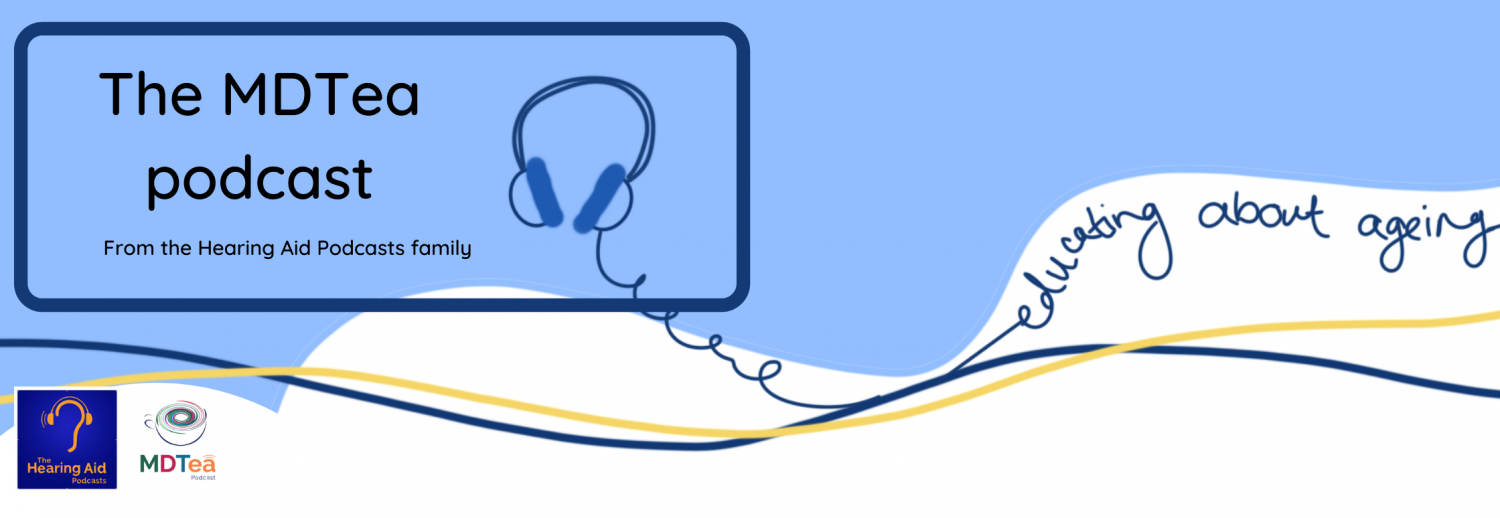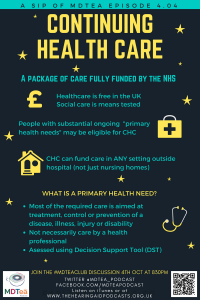4.04 Continuing Health Care
Presented by:
Dr Iain Wilkinson (Consultant Geriatrician East Surrey Hospital)
Dr Jo Preston (Consultant Geriatrician St George’s Hospital)
Sip of MDTea
Broadcast Date: 26th September 2017
PDF of this infographic
CPD log
Click here to log your CPD online and receive a copy by email.
Tweetchat #MDTeaClub
We will be hosting a ‘journal club’ type tweet chat to discuss topics raised in the episode on 4th October at 8.30pm BST using #MDTeaClub
Join us to discuss topics raised in the episode. We will post a chat summary here after it has taken place in case you miss it.
Show notes
Learning Outcomes
Knowledge:
- To understand what Continuing Health Care is
- To understand how to request an assessment
- To understand the requirements of an assessment
Skills:
- To recognise if a person should be assessed for CHC
- To understand the assessment process
Attitudes:
- To understand the importance of considering if a person is eligible to be assessed for CHC
- To understand the difference between a primary need and a social care need
Definitions:
NHS Continuing Health Care: a definition:
NHS continuing healthcare (sometimes referred to as ‘fully funded NHS Care) is the name given to a package of care that is arranged and funded solely by the NHS for individuals who have been assessed as having a “primary health need”.
‘Primary health need’ (not defined in primary legislation) but in general terms can be defined as being related to the:
- Treatment, control or prevention of a disease, illness, injury or disability; and
- The care or aftercare of a person with these needs, whether or not the tasks involved have to be carried out by a health professional.
Healthcare is currently free in the uk.
The alternative is a social care need… (which is means tested)
Is focused on:
- Providing assistance with activities of daily living;
- Maintaining independence, social interaction, enabling the individual to play a fuller part in society;
- Protecting them in vulnerable situations;
- Helping them to manage complex relationships; and
- In some circumstances, accessing a care home or other supported accommodation.
Individuals have a primary health need if, having taken account of all their needs, it can be said that:
- The main aspects or most of the care they require is focused on addressing and/or preventing health needs; or
- The nursing or other health services that they need are not of a nature that a social services authority can lawfully provide.
Key Points from Discussion
Where is NHS continuing healthcare provided?
Eligibility for NHS Continuing Healthcare places no limits on the settings in which the support can be offered. Can be:
- In the person’s own home
- in a care home
In 2015: Nationally the spend on NHS Continuing Healthcare stood at around £2.5 billion per annum and around 60,000 individuals were in receipt of NHS Continuing Healthcare at any given time.
The legal mandate:
- The Health and Social Care Act 2012 sets out the powers for this process which is set out in the National Framework for NHS Continuing Healthcare and NHS-funded Nursing Care 2012 (Revised) (the National Framework)
- The process has to be followed by every CCG, meaning that there should be no variation in access, and the assessment process should be consistent across the NHS.
NHS England Operating Model for NHS Continuing Healthcare
What is Continuing Health Care? A brief history:
Continuing health care asks the question, who should be responsible for funding the health and social care for an individual.
- In the 1970s/80s, people remained on a long stay ward (community hospitals), funded by the NHS, or moved into private nursing homes. – (led to the first uses of the banned term ‘bed blocking’)
- Growth in community care meant, people were encouraged to either remain in their own home or were funded by the then DHSS in nursing homes.
- The NHS & Community Care Act 1990 placed the responsibility on LA’s to fund residential accommodation for people who were in need of care and attention because of illness.
- For the first time the LA’s (SSs) were being responsible for arranging nursing home places
- The NHS continued to have the ability to fund NHS places for those people who would have remained in hospital this has become the exception not the norm.
- 1994 The Health Service Ombudsman challenged this approach to practice in what became known as the ‘Leeds report’.
- The case was a highly dependent patient, who was discharged to a nursing home where he had to pay for his care. The Ombudsman criticised the drift towards transferring responsibility from (free) NHS care to (means-tested) local authority care, concluding that the failure to provide long-term care within the NHS for this patient was ‘unreasonable and constituted a failure in the service provided by the health authority’.
- In response in 1995 the DoH issued guidance on the NHS responsibilities for meeting continuing health care needs. This guidance confirmed that:
- The NHS has a clear responsibility to arrange and fund services to meet the needs of people who require continuing health care.
- This includes, but is not limited to, arranging and funding care for those people who require continuing inpatient care under specialist supervision from the NHS.
- Also covers responsibility for arranging and funding rehabilitation, palliative and respite health care, specialist health care, support and community health services for people who live in nursing homes or residential care or at home.
- The Leeds Report was not a legal judgement, the legal mandate for the provision on CHC is contained within the National Health Service Act 2006 (and in the National Health Service (Wales) Act 2006 for Wales). The Secretary of State for Health having the duty to provide:
- To such extent as he considers necessary to meet all reasonable requirements… services or facilities for the prevention of illness and the after-care of persons who have suffered from illness as he considers appropriate as part of the health service.
- In cases where there are significant health needs the NHS clearly has a responsibility to provide both health and social care.
Integrated health and social care in England: the story so far
NHS CHC: The process
- Eligibility
- Assessment
Who is eligible for NHS continuing healthcare?
- 18 and over and having substantial and on going care needs.
- assessed as having a “primary health need”.
Person-centred Practice: is essential when undertaking an CHC assessment and includes
- Ensuring that the person is fully and directly involved in the assessment and the decision-making process.
- Taking full account of the individual’s views and wishes, ensuring that his or her perspective is the starting point of every part of the assessment process.
- Addressing communication and language needs.
- Obtaining informed consent to the assessment process and to sharing records, where the individual has the mental capacity to do this.
- Dealing openly with issues of risk.
- Keeping the person fully informed throughout the process
The assessment:
The full assessment tool is called the Decision support tool, but there is a screening process before this (think of it like a DST-lite) called the checklist. Both of these tools turn a person’s various care needs into essentially a numerical value.
The first step is an assessment by a nurse, doctor, other healthcare professional or a social worker using a screening tool called the Checklist Tool, a legally prescribed decision-making process,
- This can be carried out in hospital or in the community
If this screening suggests a person may be eligible a full assessment of needs will be arranged, using a tool called the Decision Support Tool, which is used to assess whether needs relate to a persons health.
A full assessment is carried out by a multidisciplinary team, with a minimum of two different professionals (doctor, nurse, social worker, healthcare professional), the aim being to build an overall picture of need.
The domains covered in the Decision Support Tool are:
- behaviour
- cognition (understanding)
- communication
- psychological / emotional needs
- mobility (ability to move around) ,
- nutrition (food and drink)
- continence
- skin (including wounds and ulcers)
- breathing
- symptom control through drug therapies and medication
- altered states of consciousness
- other significant needs
For each domain the nature, intensity, complexity and unpredictability of an individual’s needs are thought about via some guidance statements.
The assessment will be shared with person and any disagreements noted.
This process can take time and where a more urgent decision is (needed because their condition is deteriorating rapidly) the process can be ‘fast tracked’ via the Fast Track Tool instead.
What happens after the assessment?
The multidisciplinary team will make a recommendation to the Clinical Commissioning Group (CCG) about the person’s eligibility for NHS continuing healthcare – sometimes referred to as ‘the panel’.
The CCG will usually make a decision within 28 day and write to the person advising whether they are eligible, giving reasons for their decision.
What happens if the person is eligible?
The CCG will:
- appoint a ‘case manager’ to work with the person;
- provide/fund a package of care to meet all assessed health, personal care and associated social care needs,
You can receive the money in two ways:
- A Personal Health Budget
- Budget held by the NHS – person is informed how big the budget is and they inform the NHS how they would like to spend it
- Budget held by someone else i.e. charity or support service and they wok with the individual to spend the budget
- Direct payment – money given directly to the individual to spend on their care.
The care needs will be reviewed after 3 month and then, as a minimum, on a yearly basis.
What happens if a person is not eligible?
- The LA will discuss whether the person may be eligible for support from them.
- On going healthcare needs, will be meet by the NHS – a joint package of care.
The funding arrangements for on going care are complex and this is a highly sensitive area; which can affect individuals at a difficult stage of their lives.
It is essential that CHC assessments are aligned with the principles of:
- Care;
- Compassion;
- Competence;
- Communication;
- courage; and
- commitment
A good video explaining CHC can be found at: https://www.england.nhs.uk/ourwork/pe/healthcare/
NHS Choice: What is Continuing Health Care
National framework for NHS continuing healthcare and NHS funded nursing care
A guide to continuing healthcare and funded nursing care in the NHS
Curriculum Mapping:
This episode covers the following areas (n.b not all areas are covered in detail in this single episode):
| Curriculum | Area | |
| NHS Knowledge Skills Framework | Suitable to support staff at the following levels:
| |
| Foundation curriculum | Section
2 6 11 20 | Title
Patient as centre of care Interface with other healthcare professionals Discharge planning Healthcare resource management |
| Core Medical Training | The patient as central focus of care
Management of long term conditions and promoting self-care Management and NHS structure | |
| GPVTS program | Section 2.03 The GP in the Wider Professional Environment
Section 3.05 – Managing older adults
| |
| ANP (Draws from KSF) | 18 Discharge
20 The patient as central focus of care |






1 Response
Very impressive blog.
Interesting article right on the subject.